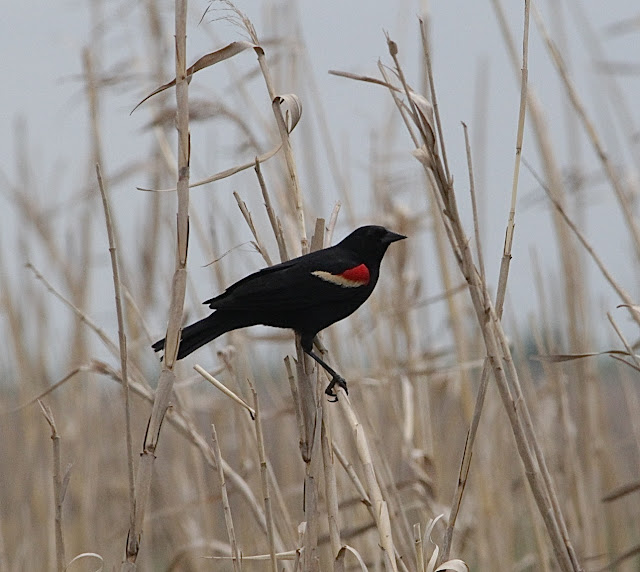This week in birds - #542
A roundup of the week's news of birds and the environment:
A Redwing Blackbird balances on a stalk in a field.*~*~*~*
The IPCC's climate assessment report issued this week did not hold much good news for the planet; nevertheless, one of the lead authors of that report still believes there is room for hope.
*~*~*~*
The annual Great Backyard Bird Count takes place in February. Here is one participant's report of this year's count.
*~*~*~*
President Biden this week designated two new national monuments in the West - one in Nevada and the other in Texas.
*~*~*~*
Jackson, Mississippi, a city where I once lived, is experiencing a crisis in its water system, basically due to neglect. And like so many of the problems in Jackson, this one has a racial component.
*~*~*~*
*~*~*~*
The naturalist John James Audubon was a racist and he held people in slavery. Many nature societies that have borne his name are now acknowledging that fact and removing his name from their organizations.
*~*~*~*
A decades-old neighborhood project in Tucson is a workable model for climate action.
*~*~*~*
Some scientists now believe that the COVID pandemic had its origins in an animal called a raccoon dog.
*~*~*~*
Almost any time of the day that I go outside, if I look up I will see a Black Vulture somewhere in the sky overhead. These birds have been endemic in a southern habitat but, with the changing climate, they have made it all the way to New York, and if you can make it there, you can make it anywhere.
*~*~*~*
The residents of Senegal are already dealing with the effects of global climate change.
*~*~*~*
*~*~*~*
*~*~*~*
It's cherry blossom time in Washington and the blooms should be reaching their peak over the next several days.
*~*~*~*
A man in Florida heard a knock on his door and opened it to find an alligator which promptly bit him on the leg.
*~*~*~*
California has had a very wet winter which has helped to alleviate its drought, but the rain, too, brings its problems. It also brings blessings including a mushroom boom.
*~*~*~*
But there is not enough rain to feed the Colorado River and that creates a very different and urgent set of problems for those who depend on it.
*~*~*~*
We know that "forever chemicals" are bad for the environment, but what effects are they having on animals in that environment?
*~*~*~*
Four species are receiving a more comprehensive look by biologists to determine if they should be placed on the Endangered Species List.
*~*~*~*
Japan has plenty of geothermal energy available but why is it not used more?
*~*~*~*
The Yakama Nation is facing a choice about developing a clean energy project that could have a negative impact on their irreplaceable tribal culture.
*~*~*~*
And this week the Supreme Court heard arguments on a case impacting access to the water of the Lower Colorado River.
*~*~*~*
Compostable bras? Why not? In fact, why not compostable clothing, period?
*~*~*~*
An 87-year-old man in Croatia derives pleasure from using part of his pension to feed the birds. It's where many of us find joy.





Good morning, Dorothy. Thank you for the weekend roundup. The Doomsday Clock is ticking inexorably closer to midnight, yet collectively the Neros of this world fiddle while the very seat they are sitting on is burning. Hooray for the old man in Croatia who enjoys feeding the birds. Sure beats killing Serbs which has long been the pastime of choice in that part of the world. I hope you are enjoying Spring in Texas before the brutal heat of Summer descends upon you. With my very best wishes - David
ReplyDeleteSpring in my part of Texas is the most pleasant of seasons, especially because the avian migrants are passing through. If one is outside on a quiet night, one can often hear them passing overhead. During daylight hours, they sometimes visit our feeders, always a joy to behold.
DeleteAn interesting and thought-provoking round-up, as always.
ReplyDeleteI'll bet that man in Florida looks before he opens his door again!